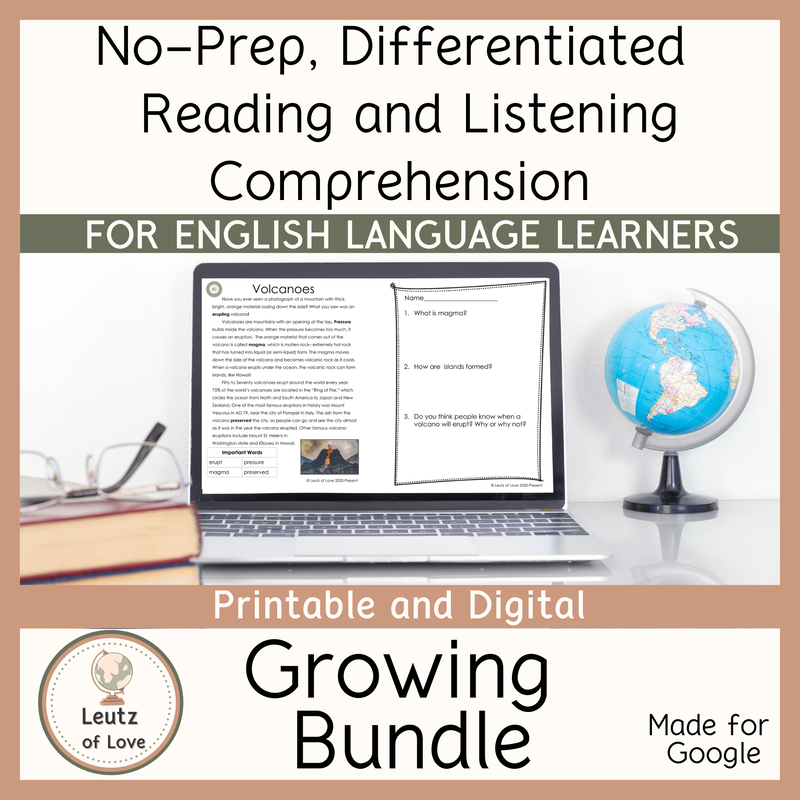Help your new-to-school newcomer student find success and confidence by teaching these 3 must-know skills.When I get a newcomer student, I want to know as much as possible about their academic experience thus far. One stat that I always keep in the back of my mind? More than half of school-aged refugees around the world do not attend school. Staggering, isn’t it? That number comes from the United Nations, and it breaks my heart every time. What breaks my heart even more? Right now, there are no good stats out there showing the real story – how many of those school-aged children have never been to school. If you’ve been teaching a high-refugee population for any amount of time, you’ve probably come across at least one student who came to your class with zero school experience. Gaining a student like this can be overwhelming, confusing, and stressful, but it can also set you up for one of the most rewarding experiences in your teaching career. Before we get in too deep on supporting our new-to-school newcomer students, are you looking for a way to support all your ESL students while keeping your sanity and actually enjoying your job? Click here for the free guide to helping your ESL classroom run like a dream! In my first year teaching elementary, I had one student join my 4th and 5th grade ESL class in October. We’ll call him Den Po. Den Po was from Burma (Myanmar) and from the information we were given from the IRC representative who was supporting his family, it became clear that not only had Den Po never attended school, he also hadn’t really been inside a walled-in building before coming to the U.S. Den Po was on the older side for fifth grade, but tiny compared to the other students. That didn’t matter though, because Den Po immediately became a larger-than-life character in our classroom. He loved making friends, acting out funny stories, and being a ray of joy in an otherwise tough class. Den Po was one of the most inquisitive, excitable students I’ve ever taught. He also is the main subject of my favorite stories about teaching. I could go on and on and on about Den Po, and I’ll scatter a few stories throughout this blog post. Though there were certainly many days where I was left scratching my head wondering how I was supposed to teach him the basics while simultaneously teaching the rest of my class geometry, when I look back, I see how much he taught me about supporting every student and how much joy he brought to our lives. If you’ve ever taught a Den Po, you know that throwing a student who has never attended school into the midst of your classroom is an overwhelming challenge to put it mildly. It can feel like an impossible task, and you might be stuck making a list of all the things you need to teach them, most of which probably aren’t even academic. I’ve taught quite a few Den Po’s in my life, and it’s led me to create this survival guide–the basics you need to teach your new-to-school newcomer students. #0 - A Reminder Before We Dive InThe list below is full of important things to teach your ESL newcomer that you might not have thought of teaching. I want to start though with a reminder that I find myself repeating to myself all the time– You can’t expect something that hasn’t been taught. You know I have a fun story to help you keep this in mind. A few weeks into school, Den Po learned about glue and how it was used. Magic! One day, our math advisor came into class and asked me to check out an issue in the girl’s restroom while he watched my class. During that time, Den Po decided to use his newfound love of glue and glue some rulers to the floor. Our math advisor walked over and stuck out his hand, clearly asking for Den Po to give him the glue and rulers. Instead, Den Po took this as “What I am doing is so fun, the teacher wants to join!” and went over to our supply bin, got another container of glue and another ruler, handed it to the advisor, and showed him how to glue rulers to the floor. While we could have been upset with him, we realized he just didn’t know yet. Den Po didn’t know what an outstretched hand meant, and he certainly didn’t know he wasn’t supposed to glue rulers to the floor. So, instead of being frustrated, we giggled and showed him what it all meant and where glue should be used. All this to say, with our newest newcomers, it can feel like there is so much they should know. It can be so hard to feel like you’re teaching preschool skills to a pre-teen, teenager, or even an adult, but it might be necessary! Monitor the student to see what they know, but step in whenever needed. It’s much better to (kindly and discreetly) show them something they already know than to not teach them and put them in a situation where they are facing the consequences of not knowing! #1 - How to Use a Bathroom Stall You didn’t think this was where we were starting, was it? Well, this is the survival guide after all! This first tip is essential, but also so important for students from so many countries! Do a quick google search about the restroom situation in your student’s home country or the country where they lived in a refugee camp. A lot of the times, you’ll find two things:
Either way, you’ll want to introduce students to bathroom expectations at school! I’ve had students who squat on the toilets, students who have locked themselves in the stall because they didn’t know how they worked (yes, Den Po was one of them), and students who refused to go to the restroom all day because they didn’t know what the loud flushing sound was coming from! After my first few months teaching refugee students, I started a “bathroom buddy” system, and I’ve never looked back because I’ve never once had a student who didn’t want a buddy with them the first few times. Now, this is obviously a situation that can get really bad really fast, so it is so important (SO important) that you choose a mature, kind, responsible student to support you with this. No students you can trust? Find a trusted adult and use them instead. This isn’t something you want to mess up! Here’s what I teach my bathroom buddies:
Check-in with your buddies frequently to make sure everything is going ok and that they feel comfortable. If you have access to an interpreter, use them to check-in with your newcomer student, too! Have more than one newcomer student? Take a field trip to the restrooms to show everyone at once! (Just make sure the restroom is completely empty first) If you haven’t taught newcomers before, this might seem crazy, but I promise, it is an essential step to help your newcomer students (even those who have been in school before in another country) feel comfortable at school! #2 - How to Use Basic School Supplies I want to start with this reminder: If you are teaching a student who has never been to school before, there is a high likelihood that they don’t know how to use a pencil. Yes, even if they are in high school! Take time to make sure that your new-to-school newcomer students know how to use all the supplies that you will use in your class! This includes pencils, pens, markers, crayons, books, notebooks, scissors, and glue. These essential skills can also make for great activities for helping your newcomer ESL student acclimate to school while giving you time to focus on the rest of your students. Tracing pages, coloring pages, materials to cut and glue to create a collage, and picture books to look at are all great independent activities that will build school supply skills! The best thing? These are all easy to model without words. Even if your newcomer student doesn’t know a word of English yet, they can get started practicing with these supplies! #3 - How to Clean Out Your Backpack This may be the first time your newcomer student has used a backpack for daily activities, not just for traveling from one place to another. My students have told me about the ways that they would carry their school supplies in their home countries, and usually, they share that they used a basket, strings, or just held their supplies. Very few students have had a backpack for school before coming to the US, and this is obviously especially true when working with students who have never attended school.
Why is this important to keep in mind? Because I once forced an entire school to evacuate because of a backpack that wasn’t cleaned out. Really. It was winter in Arizona (aka, still hot outside) and our good friend Den Po had never been taught to clean out his backpack. He just didn’t know that was something he needed to do! Long story short, there was rotting durian in his backpack. If you’ve never experienced durian before, all you need to know is that there are laws in some cities in Asia that you can’t bring durian on public transportation because of the smell. Anyway, rotting durian apparently smells like a gas leak, I called my principal in a panic, and the entire school was evacuated. Whoops. Long story short– teach backpack organization and cleaning skills. It might just save you some embarrassment down the line (and it will definitely help your students feel confident and prepared for school!) link to making students comfortable These are the three things you need to teach your newcomer students immediately upon their arrival in your classroom, but obviously, the learning doesn’t stop there. Looking for more ways to support your students and find joy in your classroom? Click here for 7 secrets to helping your ESL classroom run like a dream! While you might not have thought you’d been signing up for teaching how to use a restroom or how to use scissors when you accepted your job as an ESL teacher (especially if you’re working with older students!), I want to remind you that the challenge is worth it. These students will never forget their first teacher, and while the skills you teach them will carry them through their academic careers, the confidence you instill in them will last a lifetime. While teaching newcomer students isn’t always easy, I’m willing to bet it will make for some of the most rewarding moments of your teaching career.
0 Comments
Your comment will be posted after it is approved.
Leave a Reply. |
Categories
All
AuthorHey there! I'm so glad you're here! Categories
All
Leutz of Love Blog |








